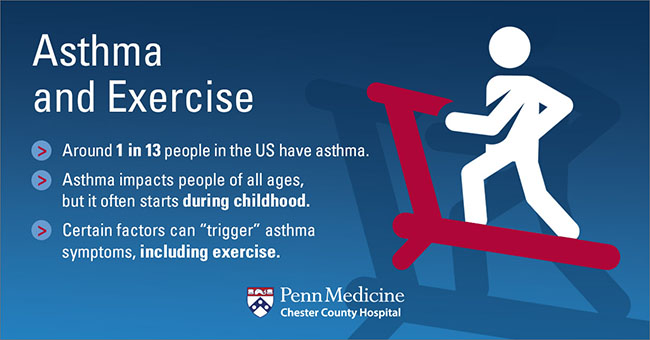
You probably already know the importance of exercise. It helps you maintain a healthy weight, prevents chronic health problems, boosts your mood, improves your sleep — the list goes on.
But if you have asthma, you might be wondering how you can exercise safely and whether or not you should exercise at all.
Asthma, which is a condition that makes the airways in your lungs become inflamed and narrowed, is common. And while exercising with asthma might require a little more knowledge and preparation, it's still a key part of staying healthy.

Here's an overview of how asthma can affect exercising, and what you can do to stay active if you have this condition.
What is Exercise-Induced Asthma?
There are plenty of triggers for asthma, from pollen to cold air to viral infections. For some people, exercise can set off a variety of symptoms, and if these symptoms worsen, you may experience what is called an asthma attack.
Exercise-induced asthma (also called exercise-induced bronchospasm, or EIB) is when your asthma symptoms only occur during exercise or other physically demanding activities.
Symptoms of exercise-induced asthma occur about 5 to 20 minutes after exercise and includes:
-
Shortness of breath
- Chest tightness
- Wheezing
- Coughing
"People with exercise-induced asthma can also be sensitive to other triggers, including low temperatures, dry air, air pollutants, high pollen levels and viral respiratory infections," says Renee Giometti, MD, FCCP in Pulmonary Medicine at Chester County Hospital. "If you are out of shape when it comes to exercise, that might also make exercise-induced asthma worse."
Diagnosing Exercise-Induced Asthma
If you experience tightness in your chest or wheezing after exercise, you may have exercise-induced asthma. Your healthcare provider can diagnose you by:
- Reviewing your health history
- Administering a breathing test (called spirometry)
- Doing an exercise test (if needed)
If a breathing test signals asthma, your provider will give you a medicine to inhale, such as albuterol. After inhaling the medicine, you'll undergo another breathing test. If your breathing improves, you may have asthma.
If your breathing test doesn't show any problems, you might be asked to do an exercise test, called a bronchoprovocation challenge test. Prior to exercise and then immediately after, your provider will test the amount of air that comes out of your lungs using a breathing test. If your exhales are less forceful after exercise, you may have exercise-induced asthma.
Should I Exercise If I Have Asthma?
"Asthma shouldn’t hold you back from staying active and getting regular exercise. Plenty of people who exercise — even Olympic athletes — have asthma," says Dr. Giometti. "The keys to safely exercising with asthma are communicating with your healthcare provider and managing your symptoms."
Talk to your provider about what exercises to avoid and which ones are safe, which may be unique to your asthma. For instance, swimming is a great exercise if you have asthma because of the warm, moist air you'll breathe as you exercise. On the other hand, sports that require constant activity, like soccer or long-distance running, might be more challenging.
Once you know what activities you can engage in safely, your provider can help you manage your symptoms.
You'll either be prescribed medication that's taken regularly or just before exercise. Your provider can also talk about what to do if asthma symptoms do occur, such as using a medication called short-acting beta-agonists.
Other ways you can ease symptoms of asthma during exercise include:
-
Warming up before exercising
- Covering your nose and mouth when exercising in cold temperatures outdoors
- Cooling down after exercising
- Paying attention to the air quality, including limiting outdoor exercise when it’s unhealthy (orange) and avoiding outdoor activities when it’s red, purple or maroon
- Limiting exercise if you have a viral infection, a cold or the flu
What To Do if You Experience an Asthma Attack While Exercising
Even if you take all the right steps to prevent symptoms, an asthma attack can occur during physical activity. That's why it's important to be prepared.
Stop exercising right away if you have:
- Tightness in your chest
- Pain in your chest
- A cough or shortness of breath
Immediately begin the plan of action you and your healthcare provider discussed. This might include taking your quick-relief inhaler, sitting down, relaxing and/or doing a belly breathing exercise.
Asthma shouldn't keep you from staying healthy and active. With some planning and preparation, you can safely exercise and manage your asthma.
Do you have questions about managing asthma during exercise?
Make an appointment with a Chester County Hospital Allergist/Immunologist to learn how to safely engage in physical activity with asthma.